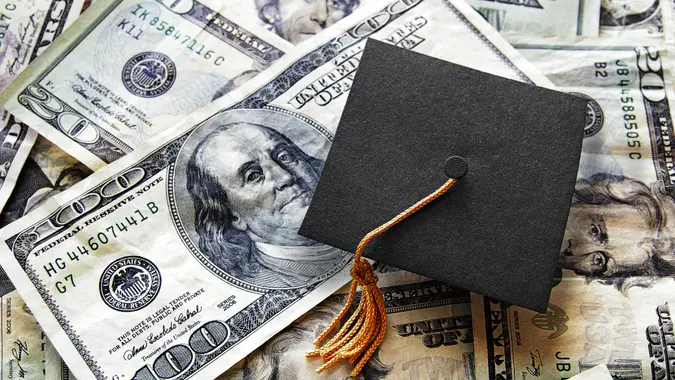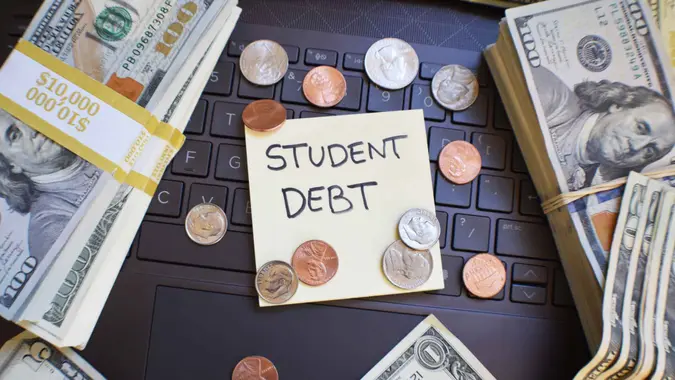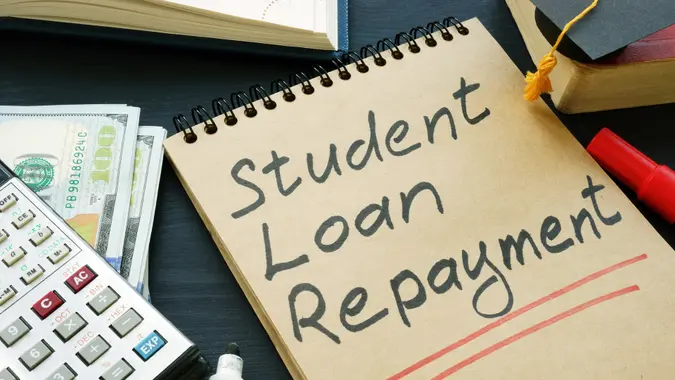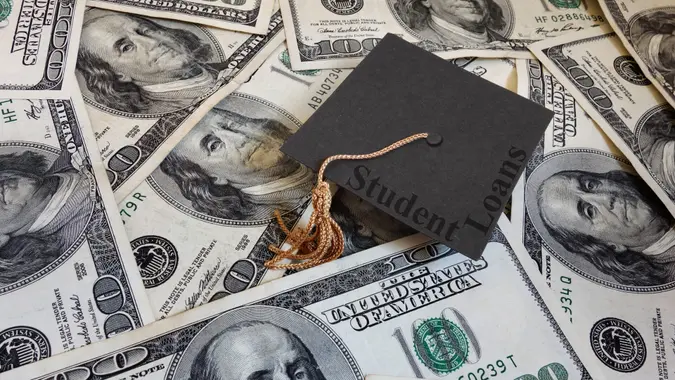If Trump Sells Your Student Loan Debt, Would That Help or Hurt You?

Commitment to Our Readers
GOBankingRates' editorial team is committed to bringing you unbiased reviews and information. We use data-driven methodologies to evaluate financial products and services - our reviews and ratings are not influenced by advertisers. You can read more about our editorial guidelines and our products and services review methodology.

20 Years
Helping You Live Richer

Reviewed
by Experts

Trusted by
Millions of Readers
Approximately 45 million Americans owe a cumulative $1.6 trillion in student loan debt to the federal government. That’s a staggering amount of money. For context, America’s ballooning national debt — the largest in the world — is approximately $38 trillion.
In response to that massive amount of the student loan debt, Politico has reported that the Trump administration is considering selling portions of it to the private market. Specifically, members at the highest levels of the Education Department and Treasury Department are holding internal discussions (as well as talks with financial executives and other potential debt buyers) about selling off the high-performing percentages of the government’s student debt portfolio.
Is Such A Selloff Possible?
In short, yes. Federal student loan laws provide the Education Department with the power to sell these debts — but only after officially liaising with the Treasury Department and only if the sale does not cost taxpayers money. The first Trump administration had considered such a sale, but the process fell apart in the face of the COVID-19 pandemic and subsequent presidential race.
However, as Politico has noted, there is very little overall precedent for such a sale.
Would This Benefit You Or Hurt You?
Given the fact that there is such scant precedent for a student loan debt sale of this size, the efficacy and impact of such a move is murky. Many economists and financial experts, however, are doubtful that it will benefit borrowers or taxpayers, and believe that, in the end, only the wealthiest investors would come out ahead.
Borrowers:
“The only way for it to make economic sense is to structure the deal in a way that really shortchanges borrowers,” said Eileen Connor, president and executive director for the Project of Predatory Student Lending.
Connor noted the student loan debt has far more value when it’s owed to the federal government, which has the exclusive advantages of unlimited loan collection time and immunity from lawsuits if the debt is mishandled. It also has the sole power to garnish tax refunds and Social Security benefits for debt nonpayment. Private entities, lacking those powers, would not find it attractive to buy those debts unless the deal greatly favors the buyers (and as a result, hurts the loan borrowers).
For example, it’s possible that many borrower protections would be destabilized as the debt transitions. Thus, the future of repayment programs and government guarantees are uncertain in the face of such a sale.
Taxpayers:
Additionally, Preston Cooper, a senior fellow at the American Enterprise Institute, suggested to Politico that such a sale simply makes little fiscal sense for similar reasons — the loans are worth more when owed to the federal government, rather than private entities. As a result, it’s unlikely many private investors would be willing to pay what the loans are worth.
“I really don’t see a scenario here where taxpayers come out ahead,” Cooper said. “I think the most likely scenario is that taxpayers get less than the loans are actually worth.”
Investors:
Finally, Mike Pierce, executive director of Protect Borrowers, felt that such a sale would only benefit the wealthiest of debt investors while leaving taxpayers and borrowers in the dust.
“Once again,” he said, “we see that across the Trump administration, when Wall Street’s demands run against the financial needs of working people, the bankers get what they want.”
Editor’s note on political coverage: GOBankingRates is nonpartisan and strives to cover all aspects of the economy objectively and present balanced reports on politically focused finance stories. You can find more coverage of this topic on GOBankingRates.com.
 Written by
Written by  Edited by
Edited by 
























